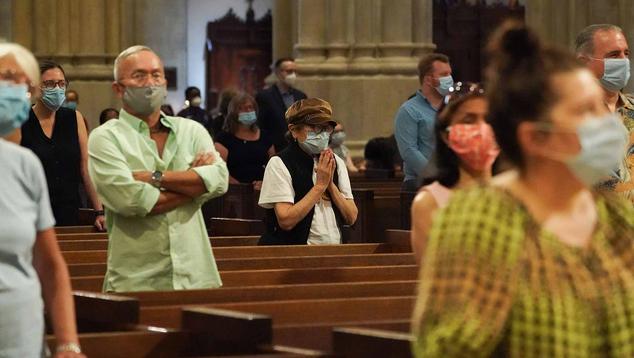Gallup's January Mood of the Nation survey confirmed the finding that Americans are largely satisfied with the way things are going in their personal life, despite their remarkable lack of satisfaction with the way things are going in the U.S. more generally.
At the same time, as my colleague Megan Brenan pointed out in her recent analysis of the data, some Americans are more satisfied than others with their personal life. One not surprising correlate of personal satisfaction is socioeconomic status. Americans with higher incomes and higher education are more personally satisfied than others.
I'm most interested, however, in the data showing that Americans who are religious, as measured by religious service attendance, are more likely to say they are personally satisfied than those who are not religious. The January Gallup data indicate that 92% of those who attend church services weekly are satisfied, compared with 82% of those who attend less than monthly. The difference is even more evident in terms of the percentage who report being very satisfied -- 67% of those who attend weekly are very satisfied with their personal life, compared with 48% among those who are infrequent attenders. Weekly religious service attenders are, in fact, more likely to say they are very satisfied than are those who make $100,000 or more in annual household income.
Religion/Wellbeing Connection Affirmed by Rigorous Research
These findings update a long line of studies confirming the connection between religion and wellbeing -- making it one of the more researched and robust findings in all of the sociology of religion.
My Gallup colleagues Dan Witters, Sangeeta Agrawal and I conducted a series of in-depth studies on the religion/wellbeing connection a decade ago. We used huge samples from our Gallup Daily Tracking, statistically controlled for demographic variables, and in a series of articles examined the significant relationship between religiosity and wellbeing and self-reported mental health. We held a conference at Gallup's Washington, D.C., headquarters presenting these and other results, and in the words of a summary published afterward, "The very religious rate their lives more positively, are less likely to have ever been diagnosed with depression, and experience fewer daily negative emotions. … The very religious also make much better health choices than do those who are not as or not at all religious."
A notable, extraordinarily in-depth review of this substantial literature in 2012 came from Harold G. Koenig, professor of psychiatry at Duke University School of Medicine. Koenig published his comprehensive summary reviewing over a century's worth of hundreds of studies looking at the relationship between religion and mental and physical health. Koenig concluded: "A large volume of research shows that people who are more R/S [religious/spiritual] have better mental health and adapt more quickly to health problems compared to those who are less R/S." Koenig's list of psychological outcomes that appear to be related, in a positive way, with religiosity included coping with adversity, hope, optimism, self-esteem, depression, suicidal tendencies, anxiety and psychotic disorders.
Another summary came from TIME: "Scientists have found, again and again, that those with a spiritual practice or who follow religious beliefs tend to be happier than those who don't. Study after study has found that religious people tend to be less depressed and less anxious than nonbelievers, better able to handle the vicissitudes of life than nonbelievers."
As is true with any area of study, the more research is done, the more scholars come up with caveats and exceptions and nuances. But the basic finding, as our recent Gallup data reinforce, is robust. There is an enduring and very well-substantiated finding of a correlation between individuals' personal religiosity and various measures of wellbeing, happiness and mental (and, in some instances, physical) health.
What Is Behind the Relationship?
The remarkably well-substantiated correlation between religiosity and wellbeing leads one, naturally enough, to the question of what is behind it. One point that arises when researchers consider any such correlation is causation. The fact that two variables are correlated is different from an assumption that one of them causes variation in the other. Ice cream sales and shark attacks are positively correlated, as are the number of firefighters sent to a fire and the damage done by a fire. We do not conclude that ice cream causes shark attacks, nor that firefighters cause damage when they arrive at a fire. More to the point, data show a positive correlation between religiosity and vaccine hesitancy in the U.S. But it's not clear that religion per se is the causal factor; a third factor, politics, may be the driver of vaccine hesitancy, while at the same time political identity is associated with religiosity.
So, it's possible that people who have high wellbeing to begin with are more likely to attend church services, rather than the other way around. It's also possible that some other third factor -- say, genetic predispositions -- could cause an individual to both be religious and to have high wellbeing. However, panel studies conducted by Harvard's Robert Putnam and others led these researchers to believe it's probable that something about being religious does in turn lead to higher wellbeing.
Questions of causation aside, researchers over the years have explored a wide-ranging number of possibilities for why religious people have higher wellbeing. These explanations run the gamut -- from the calming, positive influence of belief in a higher power that comes with religion to the positive impact of being part of a close-knit religious community that fosters friendships with other religious people. Belief in religion can give one a sense of purpose, a belief that life itself has purpose, and belief in an afterlife can mitigate worry about inevitable death. Religious individuals may have more perceived control over their life, and the structure and regularity of religious rituals could have positive effects. Research also shows that expressing gratitude reduces anxiety, and expressing gratitude is a core component of many religions.
Putnam's research is particularly focused on the value of religious friends in enhancing one's wellbeing. As Putnam says, "Something about religion seems to cause people to become more satisfied with their lives, and that 'something' turned out to be church friends. … Controlling for theology, church attendance, general sociability, and other demographic factors, gaining friends at church seems to make you both happier and nicer, and losing friends at church seems to have the opposite effects. Church friends produce happier, nicer people." (I remember Putnam saying at the Gallup symposium on religion and wellbeing that church acquaintances are "supercharged" friends.) As Putnam's research collaborator and University of Wisconsin sociologist Chaeyoon Lim notes, "To me, the evidence substantiates that it is not really going to church and listening to sermons that makes people happier, but making church-based friends and building intimate social networks there."
Should Boosting Religiosity Be a Public Policy Aim?
Another question that arises from contemplating the connection between religiosity and wellbeing is the potential translation of this relationship into public policy. Society presumably benefits if its citizens have higher levels of wellbeing, personal satisfaction and personal happiness. (After all, the U.S. Declaration of Independence includes the pursuit of happiness as one of humankind's unalienable rights.) Assuming one accepts the premise that increased wellbeing is a positive objective for society, one is left pondering the role that a focus on religion could play in bringing that about.
Some healthcare researchers, in an analogous situation, have addressed the potential role of religion in increasing positive health outcomes. Koenig, assessing research showing that religiosity and spirituality are positively correlated with health outcomes, says, "The research findings, a desire to provide high-quality care, and simply common sense, all underscore the need to integrate spirituality into patient care."
So, the question becomes: Is it possible to increase the integration of spirituality into Americans' daily life as a mechanism for increasing wellbeing?
The immediate answer to that question is presumably negative, particularly as far as government policy is concerned. The U.S. has a constitutional barrier between church and state, challenging any effort by the government to attempt to foster religion among its citizens. (At the same time, of course, the federal government does exempt religious organizations from federal taxation.) A number of activist groups oppose any connection between the government and religion. And in today's polarized environment, religion's perceived negative effect on controversial policy issues and on politics more generally in some quarters would no doubt result in pushback from any efforts to increase the impact of religion because of its relationship to wellbeing.
Future of Religion, and Hence Its Impact on Wellbeing, Is Uncertain
Even if society does not consciously attempt to increase the religiosity of its citizens as a mechanism for increasing wellbeing, is it possible that religiosity could increase organically -- essentially, on its own? History certainly would say the answer is yes. Religion in the U.S. has undergone significant ups and downs over time, particularly as evidenced by periodic "great awakenings" since the 1700s.
At the moment, however, things are moving in the opposite direction. Available evidence shows that religiosity in the U.S. is on a downslope rather than an upslope. The percentage of American adults who say they have no formal religious identity (the "nones") has risen significantly over recent decades, and the percentage of Americans who say that religion is very important in their life has edged down, as has the percentage who say they are a member of a church or synagogue. The pandemic has disrupted normal patterns of worship, making it difficult to interpret church attendance statistics, but such indicators are down as well.
The causes of these patterns in religiosity are complex and difficult to determine precisely, and efforts to predict what will happen in the future are hampered by that same complexity. The future of religion will depend in part on secular demographic trends in such areas as marriage formation, fertility and geographic mobility. The role of religion in society has throughout history reflected the influence of religious leaders, and the degree to which we will see new, charismatic religious leaders burst onto the cultural scene in the future is unknown. And, most fundamentally, the rise and fall of religion reflects changes in the theology and teachings of religious organizations and how these do or do not resonate with potential adherents.
Bottom Line
Although the connection between religiosity and wellbeing has been well-established over the decades, there would not appear to be much that can or should be done to harness the connection as a public policy objective. Certainly, if citizens become better acquainted with the research showing the positive effects of religion on wellbeing, it's possible they might be more likely to choose to be religious. It is also possible that current trends in religiosity could be reversed in the future, that the nation could become more religious, and that, in turn, could have a salubrious effect on the nation's wellbeing. But there is little evidence at the moment that religion, and perhaps the wellbeing that goes along with it, is going to have an increased presence in Americans' lives in the years ahead.




